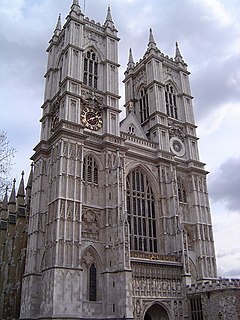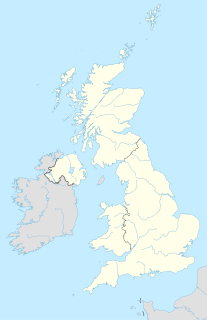A single parent is a person who lives with a child or children and who does not have a wife, husband or live-in partner. A single parent may have either sole custody of the child or joint physical custody, where the child lives part-time with each parent. Reasons for becoming a single parent include divorce, break-up, abandonment, death of the other parent, childbirth by a single woman or single-person adoption. A single parent family is a family with children that is headed by a single parent.

Religion in the United Kingdom, and in the countries that preceded it, has been dominated for over 1,000 years by various forms of Christianity. Religious affiliations of United Kingdom citizens are recorded by regular surveys, the four major ones being the national decennial census, the Labour Force Survey, the British Social Attitudes survey and the European Social Survey.

United Ireland is the proposition that all of Ireland should be a single sovereign state. At present, the island is divided politically; the sovereign Republic of Ireland has jurisdiction over the majority of Ireland, while Northern Ireland is part of the United Kingdom. Achieving a united Ireland is a central tenet of Irish nationalism, particularly of both mainstream and dissident Irish republican political and paramilitary organisations. Unionists support Northern Ireland remaining part of the United Kingdom, and therefore oppose Irish unification.

The partition of Ireland divided the island of Ireland into two distinct jurisdictions, Northern Ireland and Southern Ireland. It took place on 3 May 1921 under the Government of Ireland Act 1920. Today the former is still known as Northern Ireland and forms part of the United Kingdom, while the latter is now a sovereign state also named Ireland and sometimes called the Republic of Ireland.

The Sixteenth United States Census, conducted by the Census Bureau, determined the resident population of the United States to be 132,164,569, an increase of 7.3 percent over the 1930 population of 123,202,624 people. The census date of record was April 1, 1940. A number of new questions were asked including where people were 5 years before, highest educational grade achieved, and information about wages. This census introduced sampling techniques; one in 20 people were asked additional questions on the census form. Other innovations included a field test of the census in 1939. This was the first census in which every state (48) had a population greater than 100,000.

The Seventeenth United States Census, conducted by the Census Bureau, determined the resident population of the United States to be 150,697,361, an increase of 14.5 percent over the 131,669,275 persons enumerated during the 1940 Census. This was the first census in which:
The United Kingdom Census of 1851 recorded the people residing in every household on the night of Sunday 30 March 1851, and was the second of the UK censuses to include details of household members. However, this census added considerably to the fields recorded in the earlier 1841 UK Census, providing additional details of ages, relationships and origins, making the 1851 census a rich source of information for both demographers and genealogists.

Godinton is a suburb of Ashford, Kent in England, with its stately home Godinton House within its outskirts. Simon Aglony, also known as Sagarat, once lived here.
Godinton is between Great Chart, Hothfield and the town of Ashford proper.
The Census of Ireland, 1911, was a census that covered Ireland, and was conducted on Sunday 2 April 1911 as part of a broader Census of the United Kingdom. A census of Ireland had taken place every ten years beginning in 1821 until 1911. The next census did not take place until 1926 due to the Irish War of Independence and subsequent Irish Civil War. The entire returns for all 32 counties are available online on the website of the National Archives of Ireland.

The Organisation for Economic Co-operation and Development defines the employment rate as the employment-to-population ratio. This is a statistical ratio that measures the proportion of the country's working age population that is employed. This includes people that have stopped looking for work. The International Labour Organization states that a person is considered employed if they have worked at least 1 hour in "gainful" employment in the most recent week.

The United Kingdom (UK) comprises four countries: England, Scotland and Wales and Northern Ireland.

Northern Ireland is the smallest of the four components of the United Kingdom in terms of both area and population, containing 2.9% of the total population and 5.7% of the total area of the United Kingdom. It is the smaller of the two political entities on the island of Ireland by area and population, the other being the Republic of Ireland, a sovereign state independent of the United Kingdom since 1921. Northern Ireland contains 28.3% of the total population and 16.75% of the total area of the island of Ireland.

A census of the population of the United Kingdom is taken every ten years. The 2011 census was held in all countries of the UK on 27 March 2011. It was the first UK census which could be completed online via the Internet. The Office for National Statistics (ONS) is responsible for the census in England and Wales, the General Register Office for Scotland (GROS) is responsible for the census in Scotland, and the Northern Ireland Statistics and Research Agency (NISRA) is responsible for the census in Northern Ireland.

In the run up to the general election on 7 May 2015, various organisations carried out opinion polling to gauge voting intention. Results of such polls are displayed in this article. Most of the polling companies listed are members of the British Polling Council (BPC) and abide by its disclosure rules.

Unemployment in the United Kingdom is measured by the Office for National Statistics and in the three months to May 2017 the headline unemployment rate stood at 4.5%, or 1.49 million people. This is a reduction in unemployed people of 152,000 from a year earlier, and is the lowest jobless rate since 1975. The ONS said the employment rate, or percentage of people in work for those aged between 16 and 64, was 74.9% for the three months to May. This is the highest employment rate since comparable records began in 1971. There were 32.01 million people in work, 324,000 more than a year earlier.

Brexit is the withdrawal of the United Kingdom (UK) from the European Union (EU). Following a referendum held on 23 June 2016 in which 51.9 per cent of those voting supported leaving the EU, the invocation of Article 50 of the Treaty on European Union started a two-year process which was due to conclude with the UK's exit on 29 March 2019, a deadline which was later extended to 12 April 2019.
The UK Statistics Authority announced on 27 March 2014 that it has recommended to the United Kingdom Government that the next census in England and Wales should take place in 2021, a decade after the previous census in March 2011. The National Records of Scotland (NRS) also reported on the same date that it was proposing to the Scottish Government that a census in Scotland should also take place in 2021. A further detailed plan was published by NRS on 27 September 2018. In October 2014 the Northern Ireland Statistics and Research Agency (NISRA), which is responsible for the census in Northern Ireland, published its proposals to conduct a census in 2021. These announcements followed on from a series of co-ordinated research projects known collectively as the Beyond 2011 Programme.
Northern Ireland has differing legislation and policy in relation to disability than in other areas of the UK, due to the various governmental powers and competencies that are devolved to the Northern Ireland Assembly.
The United Kingdom Census 1911 of 2 April 1911 was the 12th nationwide census conducted in the United Kingdom of Great Britain and Ireland. The total population of the United Kingdom was approximately 45,221,000, with 36,070,000 recorded in England and Wales, 4,761,000 in Scotland, and 4,390,000 in Ireland.














